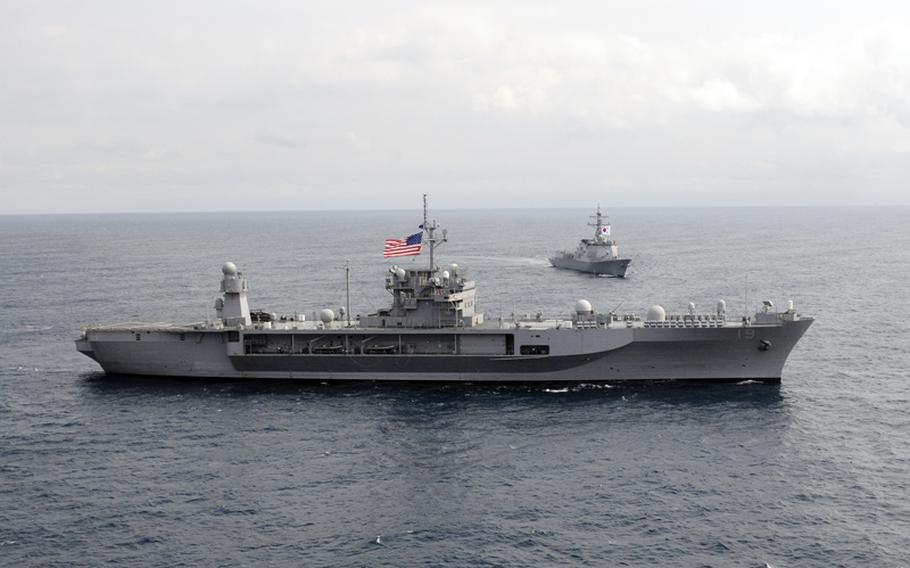Asia-Pacific
US use of 'Sea of Japan' rankles South Koreans
Stars and Stripes May 16, 2013

In this file photo, the USS Blue Ridge, front, and Republic of Korea guided-missile destroyer ROKS Sejnog the Great patrol the Sea of Japan. In April 2012, the international organization in charge of naming water bodies, rejected a request by South Korea to rename -- or at least consider an alternative name for -- the Sea of Japan. Many South Koreans call the body of water the East Sea. (U.S. Navy photo)
SEOUL — The U.S. and South Korea routinely bend over backwards to compliment one another and extoll the virtues of their partnership. But there’s a bit of semantics that sets South Koreans’ teeth on edge.
South Korea Ministry of National Defense has formally complained to U.S. Forces Korea about a reference in a 7th Fleet press release to the “Sea of Japan.”
South Koreans call the body of water east of the Korean peninsula as the “East Sea,” and they bristle at references to the Sea of Japan, which they believe is an outdated designation left over from a dark period in their history when their homeland was a Japanese colony.
The reference to the “Sea of Japan” in the 7th Fleet release about the nuclear-powered USS Nimitz aircraft carrier participating in a joint U.S.-South Korea naval exercise earlier this week was eventually changed to “international waters east of the Korean peninsula,” officials said.
Ministry officials - who would not release the letter sent to USFK - said they were pleased with that change, but would have preferred the release made reference to the “East Sea” as an alternate name for the “Sea of Japan.”
They added the ministry plans to bring up the sea-naming matter at future policy meetings between the U.S. and South Korea militaries.
USFK referred questions about the ministry complaint to the 7th Fleet. Attempts to get a response from the fleet Thursday were unsuccessful.
However, USFK officials have in the past explained that while they recognize how sensitive Koreans are on the subject, American military policy is to follow the designations of the U.S. Board on Geographic Names.
“This is a long-standing U.S. policy that we apply all around the globe,” a USFK spokesman said about a year ago. “We understand that the Republic of Korea uses a different term.”
The U.S. military’s insistence that the internationally recognized “Sea of Japan” designation be used on all maps, plans and correspondence it shares with its South Korean counterparts is one of the few subjects of public disagreement between the two allies.
A spokeswoman for the South Korea Ministry of Foreign Affairs said last year, “We wish that the U.S. used only ‘the East Sea.’ But, if that’s too hard to do, we want the U.S. to at least use both names.
“We’ve asked … them about it frequently, and whenever the subject comes up, the problem is still not fixed,” she said.
Japanese officials contend the body of water dividing the two countries has been called the “Japan Sea” or “Sea of Japan” for centuries, and it makes sense to name it after their country because the sea laps up against a far greater amount of Japanese coastline than Korean coastline.
South Korean officials counter that in the years leading up to the International Hydrographic Organization’s initial 1929 issuance of its “Limits of Oceans and Seas” – the bible for names of water bodies and waterways around the world - their country was under Japan’s rule and could not oppose its request to call the body of water the “Sea of Japan.”
The IHO - the international organization in charge of naming water bodies – last year rejected a proposal from South Korea that the disputed body of water be known as both the “Sea of Japan” and “East Sea.” The organization is not scheduled to meet again until 2017.
South Korean government officials have vowed to continue their fight to, at the very least, get the “East Sea” recognized as an official alternative to “Sea of Japan.”
One example of why the issue is so important to Koreans can be found in the first line of South Korea’s national anthem: “God protect and preserve our country … until that day when Mount Baekdu’s worn away and the East Sea’s waters run dry.”